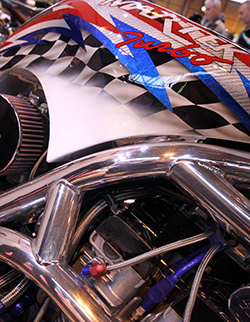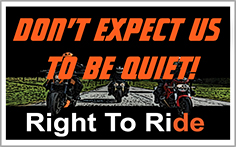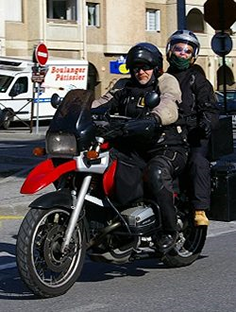22nd July 2014
 From Monday 21st July 2014 the full responsibility for all vehicle licensing services was transferred in Northern Ireland to the Driver and Vehicle Licensing Agency (DVLA) in Swansea, which saw the closure of the Driver & Vehicle Agency (DVA) offices in Northern Ireland.
From Monday 21st July 2014 the full responsibility for all vehicle licensing services was transferred in Northern Ireland to the Driver and Vehicle Licensing Agency (DVLA) in Swansea, which saw the closure of the Driver & Vehicle Agency (DVA) offices in Northern Ireland.
How to SORN (Statutory Off Road Notification) your motorcycle if you don’t use or keep your vehicle on a public road (eg you keep it in a garage, on a drive or on private land) has now changed.
Apart from now being able to SORN on-line when you SORN a vehicle you will no longer have to “renew” SORN every year, your SORN is valid until your vehicle is taxed (put it back on the road), sold or scrapped.
Make a SORN Declaration – Click Here
Winter
During winter or the run up to winter as the bad weather is starting to take a grip, riders may be putting their bikes away for winter, or taking them “off-road” to start that winter project.
If you are thinking of storing your bike away over the winter, don’t forget you may need to notify the DVLA and make a SORN (Statutory Off Road Notification).
This would be the case if you are not renewing your vehicle licence Tax Disc – VED, because you are taking the vehicle off the road – by law you must notify DVLA.
Every vehicle in the UK must either be taxed or have a SORN Declaration in force.
Riders in Great Britain have a similar system in place but also have continuous insurance to tend with, although this is now being consulted on in Northern Ireland.
If you are SORNing your bike there is plenty of advice on the internet about preparing your bike for storage and putting it back on the road and – we have reproduced some of that advice from Haynes – Practical Manuels and Books (see below).
Don’t forget to check with your insurance company because they may offer discounts with a change in insurance cover if the bike is off the road.
When to make a SORN (Statutory Off Road Notification)
 Every vehicle registered in Northern Ireland (NI) must be taxed if used or kept on a public road.
Every vehicle registered in Northern Ireland (NI) must be taxed if used or kept on a public road.
If not it could be wheel clamped or removed.
If the vehicle is kept off-road it must either be taxed or have a SORN (Statutory Off Road Notification) in force.
When SORN is needed
Make a SORN:
- if your vehicle is being kept off the road due to repair or MOT failure or isn’t being used
- if you’re not renewing your tax disc and you’re keeping the vehicle off-road
- if you’re applying for a refund and keeping the vehicle off the road
- in advance if your vehicle is to be kept off the road in Northern Ireland when you’re abroad
- if you buy an untaxed vehicle and do not tax it
- Your SORN is valid until your vehicle is taxed, sold or scrapped.
Original Source – NI Direct Government Services
Also don’t forget that over the winter, your riding skills may become rusty if you are “hibernating”.
Think of taking refresher training or book an advanced riding course or look out for the PSNI Bikesafe assessments after your hibernation!
Mothballing your motorbike – expert advice for bikers from Haynes
As the nights draw in and the temperature drops experts at Haynes are offering practical advice for riders preparing to put their bike away for the winter.
Preparation is key, particularly if bikes are to be stored for long periods of time in cold, damp atmospheres such as garages and sheds.
Penny Cox, Motorcycle Editorial Manager for Haynes Publishing, renowned for motorcycle manuals and books, outlines her top tips for protecting your bike.
Penny Cox says: “For many a motorcyclist now is time to hang up the helmet and seek the refuge of four wheels until the spring. It’s important to prepare your bike for storage so you’re not in for a nasty surprise when the warmer, dryer conditions return and you’re raring to get back on the road.”
Haynes top tips for preparing your bike for storage:
Battery
- Remove it from the bike – in extreme cases of cold the battery may freeze and crack its case.
- Check the electrolyte level and top up if necessary (conventional refillable batteries). Clean the terminals.
- Store the battery off the motorcycle and away from any sources of fire.
- Position a wooden block under the battery if it is to sit on the ground.
- Give the battery a charge for a few hours every month or invest in a trickle charger which enables a regular constant charge to be applied.
Engine
- Remove the spark plug(s) and lubricate the cylinder bores with approximately a teaspoon of motor oil using a spout-type oil can.
- Reinstall the spark plug(s). Crank the engine over a couple of times to coat the piston rings and bores with oil.
- If your bike has carburettors, drain them of fuel otherwise there is a risk of jets becoming blocked by gum deposits from the fuel.
- Consider adding a fuel stabiliser to the fuel in the tank to prevent internal corrosion occurring. If the tank is drained completely, beware that corrosion of its internal surfaces may occur if left unprotected for a long period.
- The tank can be treated with a rust preventative especially for this purpose. Alternatively, remove the tank from the motorcycle and pour half a litre of motor oil into it, install the filler cap and shake the tank to coat its internals with oil before draining off the excess. The same effect can also be achieved by spraying WD40 or a similar water-dispersant around the inside of the tank via its flexible nozzle.
- On bikes with liquid-cooling systems, make sure the cooling system contains the correct mix of antifreeze. Antifreeze also contains important corrosion inhibitors.
- The air intakes and exhaust can be sealed off by covering or plugging the openings. In the case of the exhaust silencers make sure that you do not seal in any condensation; run the engine until it is hot, then switch off and allow to cool. Tape a piece of thick plastic over the silencer end(s). Note that some advocate pouring a tablespoon of motor oil into the silencer(s) before sealing them off.
Tyres
- Place the bike on its centrestand. Where only a sidestand is fitted, use an auxiliary stand to support the motorcycle in an upright position.
- Position a piece of board or blocks of wood under the tyres to keep them off the ground and to provide insulation from damp.
- Deflate each tyre by 5 to 10 psi, no more or the beads may unseat from the rim, making subsequent inflation difficult on tubeless tyres.
Rust Prevention – body and components
- Lubricate all lever, pedal, stand and footrest pivot points. If grease nipples are fitted to the rear suspension components, apply lubricant to the pivots.
- Lubricate all control cables.
- Apply a wax protectant to all painted and plastic components. Wipe off any excess, but don’t polish to a shine. Where fitted, clean the screen with soap and water.
- Coat metal parts with Vaseline (petroleum jelly). When applying this to the fork tubes, do not compress the forks otherwise the seals will rot from contact with the Vaseline.
- Apply a vinyl cleaner to the seat.
Storage Conditions
- Aim to store the bike in a shed or garage which does not leak and is free from damp.
- Drape an old blanket or bedspread over the bike to protect it from dust and direct contact with sunlight (which will fade paint). This also hides the bike from prying eyes. Beware of tight-fitting plastic covers which may allow condensation to form and settle on the bike.
Original Source Haynes – Click Here
For motorcycle manual other great tips and much more visit www.haynes.co.uk
More Information and Links
SORN and Untaxed Vehicles – nidirect government services – Click Here
BikeSafe in Northern Ireland – Click Here
Ride It Right – Mark up your riding skills – Click Here
Organise some Motorcycle First Aid Training – good for groups – www.firstaidforriders.org
Brush up on riding tips – at Ride It Right – Click Here



Northern Ireland SORN Update
An update received from the Driver & Vehicle Agency (DVA).
The legislation that introduced indefinite SORN is UK-wide – when you SORN a vehicle you will no longer have to “renew” SORN every year, you will only have to unSORN a vehicle if you put it back on the road.
The legislation came into effect in Northern Ireland on 16th December 2013.
From that date, the requirement for a vehicle keeper to renew a SORN every year was removed.
This change applies to all SORN declarations that were still valid on 16th December 2013 and to any new SORN declarations made after that date.
SORN And Untaxed Vehicles – nidirect government services – Click Here
From Monday 21st July 2014 the full responsibility for all vehicle licensing services in Northern Ireland was transferred to the Driver and Vehicle Licensing Agency (DVLA) in Swansea which saw the closure of the Driver & Vehicle Agency (DVA) offices in Northern Ireland.
How to SORN (Statutory Off Road Notification) your motorcycle if you don’t use or keep your vehicle on a public road (eg you keep it in a garage, on a drive or on private land) has now changed.
Apart from now being able to SORN on-line when you SORN a vehicle you will no longer have to “renew” SORN every year, your SORN is valid until your vehicle is taxed (put it back on the road), sold or scrapped.
Make a SORN Declaration – Click Here